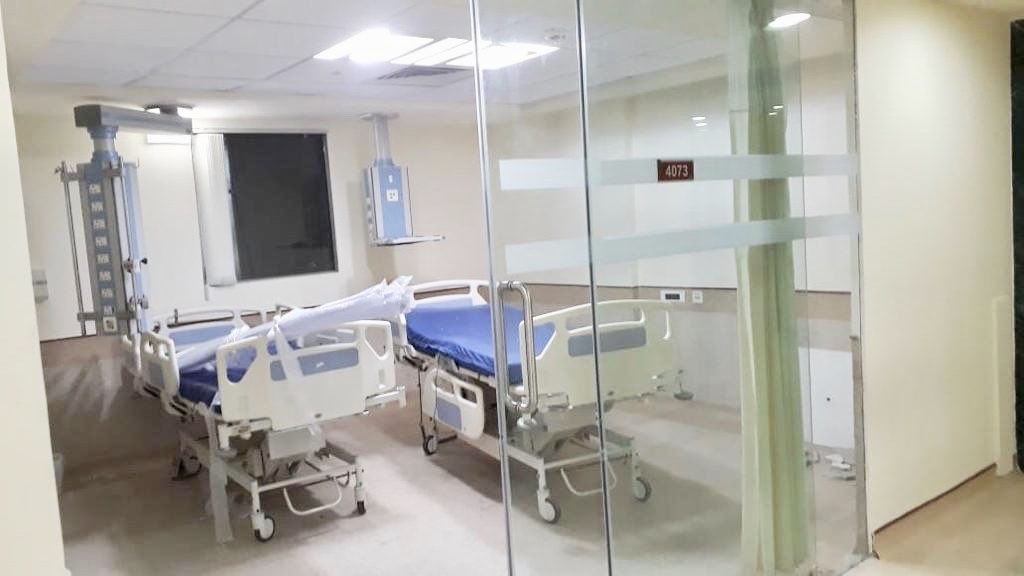FEATURE-Mumbai bets on iconic sites to tackle coronavirus bed shortage

- Country:
- India
From ritzy racecourse to people's planetarium, Mumbai is turning iconic sites into emergency coronavirus wards to tackle a chronic bed shortage in India's financial hub.
Indian cities are enlisting vast spaces including stadiums in New Delhi and Pune as quarantine centers. A sports village built for the World Military Games in Hyderabad more than a decade ago has been rapidly repurposed as a hospital. But the challenge appears bigger in India's most populous city of Mumbai: home to 20 million people, nearly half crammed into informal settlements or slums, many others spread across suburbia.
"The city expanded and suburban areas came up, but public health facilities did not expand," said Abhay Shukla, co-convener of Jan Swasthya Abhiyaan, a national coalition of non-profits working in the health sector. "(The civic body is) taking over stadiums and private hospitals because now you have a full-blown epidemic on hand. You have to control it," he said.
Healthcare facilities are stretched globally, with some Asian countries using makeshift camps and turning luxury hotels into quarantine facilities. A rugby stadium in Wales was repurposed into a hospital in March and mega convention centers from London to New York have mutated into temporary COVID-19 wards.
Mumbai had by Wednesday racked up more than 34,000 cases of the new coronavirus, amounting to more than a fifth of all the COVID-19 patients logged in India, according to government data. Amid reports of patients waiting long hours for a bed, the city unveiled plans for "jumbo" facilities to ease the strain.
Ashwini Bhide, of Mumbai's civic corporation, said a 5,000-seater stadium that was converted into a 500-bed quarantine facility last month had "served the city to a huge extent". "Hinging upon that experience, new facilities are planned," Bhide told the Thomson Reuters Foundation.
Patients have been waiting hours, days even for a bed, shunted from hospital to hospital, with many dying as they waited on a bed in vain. The Indian Express newspaper reported last week that public hospital doctors were forced to treat many patients on "floor mattresses and wheelchairs" for lack of bed space.
The crisis is only set to worsen, health experts fear, as cases mount.
NEITHER SAFE NOR SANITARY
Mumbai's ability to tackle the pandemic is hindered not just by inadequate public healthcare, but also by its jam-packed and often haphazard housing, creating a breeding ground for disease. Health experts say it would be impossible to stop the spread of what is a fast-moving virus in the squalid living conditions seen in many poorer countries, where social distancing is hard, clean water scarce, sanitation poor, and illnesses rife.
"You can be informal housing, but that housing doesn't mean it is safe and sanitary," said Hussain Indorewala, who teaches planning theory, housing, and humanities at Kamla Raheja Vidyanidhi Institute for Architecture in Mumbai. Among facilities enlisted to tackle the bed shortage include the Nehru Planetarium, a favorite day trip for school children who gaze up at stars and planets hovering on a massive dome-shaped universe, a landmark now requisitioned for quarantine.
This month, beds were also installed in a nature park in the heart of the city, commonly called the lungs of Mumbai. The park - which usually offers respite from city crowds and dusty heat - sits next to Asia's largest slum, Dharavi, where coronavirus cases have spiked among the cramped settlements. A massive exhibition ground in suburban Goregaon - host to 20 million visitors a year at trade fairs touting everything from gold to housing - has also been turned over for quarantine.
Strangest of all for many Mumbai citizens is the sight of sprawling Mahalaxmi Racecourse in South Mumbai, home to the top event of India's horse-racing calendar, the annual Derby, a magnet for glitterati and race fans alike. "A quarantine tent has come up at the car park area and an ICU (intensive care unit) tent is coming in the members' enclosure," said Zinia Lawyer, chairwoman, marketing, at the Royal Western India Turf Club that runs the course.
"This is a pandemic that we have never seen...we are keen to see our city overcome it," she said.
'JUMBO' SITES
Municipal officials in Mumbai told reporters on Tuesday that Mumbai would have about 100,000 beds in total by mid-June and another 50,000 beds by the month's end. Two of the "jumbo" sites planned are nearly ready and work begins on a couple more spaces this week, officials said.
"These facilities would make adequate beds available to take care of the increasing number till the curve is flattened by end of June or mid-July," said Bhide. Bhide said the city had more than 30,000 beds to quarantine the nearly 20,000 people it expected to see with mild symptoms by the end of May, and 6,400 beds for more serious cases, which are expected to total 10,500.
"We need to triple the current capacity," she said. The municipal authority has also ordered public officials to take control of 2,400 beds in private hospitals in the city for coronavirus patients, officials said in a press statement.
For locals, their city landmarks could not be better used. "In an emergency, you are desperate," said Mumbai historian Rafique Baghdadi.
"You have to use these facilities. These landmarks will be there, but right now we need them to save lives," the septuagenarian said.
(This story has not been edited by Devdiscourse staff and is auto-generated from a syndicated feed.)










